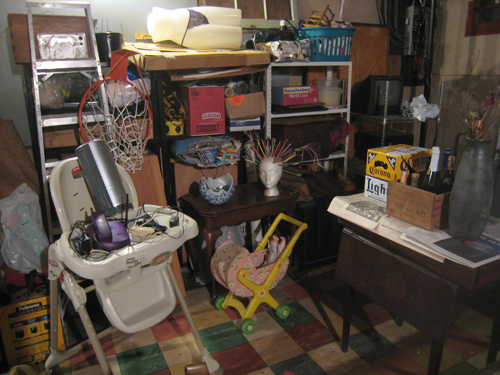
A friend asks: "I have a garage full of junk that I can't seem to get rid of. Not just junk junk, but clingy junk: books and pictures that were once meaningful to me, trinkets and tchotchkes from old friends and lovers, notebooks and papers from when I attended college in the pre-computer age, once-snazzy electronic equipment that's now obsolete, once-stylish clothes that probably doesn't even fit me anymore, etc., etc., etc. I know I'll never use any of this stuff, and I don't feel any strong desire even to look at it, yet I somehow can't bring myself to throw it away. Any advice?"
It's hard, isn't it? Each piece of sentimental junk feels like a part of your life, a part of you, so that the prospect of throwing it away feels as if you would be ripping out and throwing away a part of yourself.

Most of us have that collection somewhere, whether it's in a drawer or a closet, a garage or a basement. Some people have an entire houseful of the stuff, and eventually they have to rent storage space for the overflow. Some people even have cartons full of stuff that they packed up two or three houses back; every time they move, the boxes move with them, perpetually unopened. And then, when we reach a certain age, we start to realize that, if we don't sift through this stuff, someday our kids will be stuck with it.
Why does this stuff arouse such mixed feelings? Why do we at once cling so tightly to it yet long to be rid of it?
I think it's because it embodies our idea of who we are, as the accumulated sedimentary layers of everyone we think we've been. It's the concrete, three-dimensional illustrations of the elaborate story of ourselves that we've been spinning all these years. At the same time, some deeper intuition tells us we're not just our stories. We're something more, or, better yet, something less than them. We're something free of them: the simple, crystalline Pure Being that is the boundless, silent space within which our varied stories arise and vanish like so many holographic movies. At a deep, intuitive level we yearn to let all those stories just blow away and leave us to marinate in that freedom. Nirvana means, literally, "blown away."
So, back to your garage full of junk. Here's a reality check for you. Imagine that you get a phone call today at work, informing you that it has burned to the ground. Your insurance will rebuild the garage, but all your junk has been lost. On balance, do you feel sad or happy, deprived or relieved? If you feel more relieved -- and I'll bet you do -- that's your confirmation that you want freedom, the unspeakable lightness of being more than the weight of your old stuff. And it may be just the perspective shift you need to wade in, roll up your sleeves, and start ruthlessly chucking junk into the dumpster. Grab the first gewgaw and just do it, quick, like ripping off a Band-Aid. You'll immediately get some taste of that lightened-up sensation, and that will make it easier to throw away the next thing.
If throwing everything away sounds too ruthless, you can imagine you're at home when the garage catches fire and you have four minutes to pull stuff out. Ready? Go!
For that matter, some of the stuff that's just junk to you could be truly useful to someone else. That sweater that you'll never wear could be keeping a homeless person warm. The dollies and stuffed animals of your childhood could be making some other, actual children much happier. (You can keep one or two favorites. That's just human, and fine, I'm sure.)
Here's some wisdom on this topic from the brilliant Advaita master Mooji:
Occasionally on Sunday mornings, I enjoy going to flea markets. There you find, in heaps on the ground, objects that were once someone's treasure -- now selling for peanuts. Old family portraits, a wedding dress, a ring, an old ivory pipe, all lying about carelessly in the rain. Once of great sentimental value, now meaningless junk. Nothing you gain in this life can stay with you... Even this body you cannot take with you. Worms are waiting for it, and vultures; fishes are waiting and fire is waiting. Elements returning to elements, the elemental dance. "Ashes to ashes, dust to dust": the priest's farewell. If you are the body, what can you take with you? ... You are not merely the body; you are 100% Pure Being. But you must find this out for yourself. It must become your own discovery, happening in your innermost being.
Ultimately, then, it doesn't matter whether you throw the stuff away or not. (But, at least as a courtesy to your kids, throw it away!) What matters most is that inner discovery, and nothing external can impede it, neither the absence nor the presence of this or that. As that discovery dawns, you realize that all the clutter -- even the thought-clutter of your mind and the event-clutter of your life -- is powerless to obstruct the nirvanic relief of Pure Being. And through the simple process of looking within yourself, it does dawn, and everything is experienced in its glow. Then tasks and situations that once pushed and pulled you in so many ways become frictionless flow, and things that were hard to do -- even cleaning out the garage -- become easy.